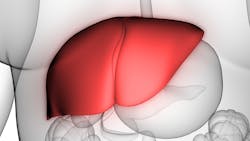UT Southwestern immunologists have uncovered a key pathogenic event prompted by obesity that can trigger severe forms of nonalcoholic fatty liver disease and potential liver failure. The finding, published in Immunity, could pave the way for developing therapies to treat nonalcoholic steatohepatitis (NASH).
The team led by Zhenyu Zhong, Ph.D., and Shuang Liang, Ph.D., Assistant Professors of Immunology, revealed that persistent obesity can damage a macrophage receptor, called TREM2, thereby disabling a critical function that otherwise keeps liver inflammation in check. The imbalance then fuels chronic liver inflammation to enable NASH development.
Drs. Zhong and Liang discovered that dietary obesity upregulates TREM2 expression in the liver-infiltrating macrophages – a critical population of immune cells responsible for removing lipid-damaged hepatocytes.
Upon examination of TREM2 expression during NASH development, the researchers unexpectedly found that persistent obesity significantly impaired macrophage-dependent removal of lipid-damaged hepatocytes by inducing TREM2 cleavage and inactivation.

